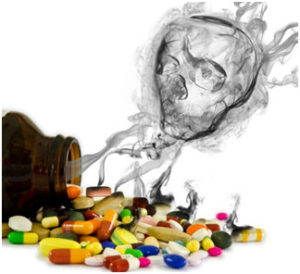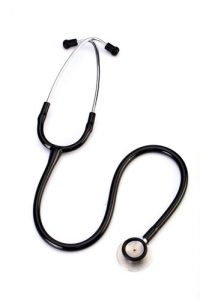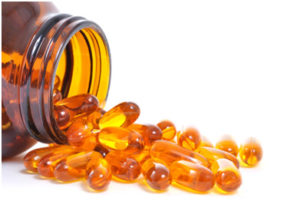The Pros and Cons Of GLP-1 Drugs
Author: Dr. Stephen Chaney
 You’ve seen the ads. You just inject these “miracle” drugs into your thigh once a week, and your excess weight magically disappears. They look like the simple solution for weight loss everyone has been looking for.
You’ve seen the ads. You just inject these “miracle” drugs into your thigh once a week, and your excess weight magically disappears. They look like the simple solution for weight loss everyone has been looking for.
More about that in a minute. Let’s first talk about what these drugs are how they work.
What GLP-1 Drugs Are: These drugs are commonly referred to as GLP-1 drugs. But their full name is GLP-1-like receptor agonists. That’s a mouthful, so let me break it down for you.
GLP-1 stands for glucagon-like peptide-1. Glucagon-like peptide-1 is produced by the stomach whenever we eat a meal. It is a hormone that binds to receptors in key organs and reduces appetite and lowers blood sugar (more about this in a minute).
GLP-1-like drugs are peptides designed to resemble the portion of the glucagon-like peptide that binds to GLP-1 receptor. The term agonist means that these drugs have the same effect as the naturally occurring GLP-1 peptide.
The difference is that the naturally occurring GLP-1 peptide hormone is rapidly degraded, so it stays in the bloodstream for a very short time after each meal. In contrast, the GLP-1-like receptor agonist drugs are designed to be much more stable, remaining in the bloodstream for a week or more. That’s why these drugs only need to be injected on a weekly basis.
How GLP-1 Drugs Work: GLP-1 drugs:
- Bind to GLP-1 receptors on the pancreas and stimulate insulin release. This can help type 2 diabetics control their blood sugar levels.
- Bind to GLP-1 receptors on the stomach and reduce the rate of gastric emptying. This prolongs the feeling of fullness after each meal.
- Bind to GLP-1 receptors on the small intestine and reduce gut motility, which increases transit time through the small intestine. This also prolongs the feeling of fullness. But it can also lead to gastrointestinal side effects.
- Bind to GLP-1 receptors on the brain and turn down your “appestat”. This reduces feelings of hunger between meals.
A Brief History Of GLP-1 Drugs
 GLP-1 drugs have been around since 2005.But the newest and most successful class of GLP-1 drugs (e.g., Ozempic) was developed in 2017 by a Danish pharmaceutical company called Novo Nordisk to help type 2 diabetics control their blood sugar levels.
GLP-1 drugs have been around since 2005.But the newest and most successful class of GLP-1 drugs (e.g., Ozempic) was developed in 2017 by a Danish pharmaceutical company called Novo Nordisk to help type 2 diabetics control their blood sugar levels.
However, once it became apparent that patients on Ozempic achieved significant weight loss, doctors started prescribing it for weight loss even though it had only been approved for controlling blood sugar. This is a practice described as “off label” use. It became so popular for weight loss that diabetics started to have trouble getting their prescriptions filled.
Novo Nordisk ramped up their production of Ozempic and introduced a second, higher potency drug, Wegovy, that is marketed primarily for weight loss. And, of course, where there is money to be made other companies have introduced their own GLP-1-like receptor agonists for both controlling blood sugar and weight loss.
The popularity of these drugs can only be described as a tsunami. To help you put it into perspective:
- Novo Nordisk’s market value is currently over $500 billion. That is larger than the GDP of Denmark where it is located.
- One in eight adults in the United States are either taking or have taken a GLP-1 drug.
- GLP-1 drugs have had 1.2 billion Tik Tok views since 2021.
The Pros And Cons Of GLP-1 Drugs
 Let me be clear. These drugs work. For people with poorly controlled type 2 diabetes or severe obesity-related health issues, they can be a godsend. But like any “quick fix” weight loss drugs they are overprescribed.
Let me be clear. These drugs work. For people with poorly controlled type 2 diabetes or severe obesity-related health issues, they can be a godsend. But like any “quick fix” weight loss drugs they are overprescribed.
The reality is that unless people on the drugs make healthy lifestyle changes, the weight comes back as soon as they quit using the drugs. So, for most people these drugs are not a short-term weight loss solution. They are a long-term necessity if they want to keep the weight off.
And whenever we are thinking about long-term drug use, we need to ask whether they are safe for long-term use.
That brings me to a story. When I was still teaching medical students, the co-director of the first-year course we ran was a medical geneticist. In his introductory lecture to the medical students he made the comment, “The only safe drug is a new drug”. After a dramatic pause he completed the statement with, “That’s because they haven’t discovered all the side effects yet.”
Let me elaborate. Before a drug can be approved by the FDA it must be proven safe and effective in a series of clinical trials. But those clinical trials have their drawbacks. They are relatively short and include a relatively small group of patients.
Sometimes it is only after a drug has been used by millions of patients for several years that we know of some of their most dangerous side-effects. For that reason, the FDA and regulatory agencies in other countries have a monitoring system for detecting “adverse drug reactions” (side-effects) after the drug has been approved.
Simply put, doctors report adverse drug reactions to a central agency. When enough adverse events of a particular type have been detected, clinical studies are initiated to determine how significant that side effect is.
Medical history is littered with drugs that passed the initial company-run clinical studies with flying colors and were introduced to the general public with great fanfare – only to be withdrawn a few years later once serious side-effects had been discovered. One might ask whether GLP-1 drugs may be in the same category.
When you look at the official Ozempic and Wegovy websites they say that the most common adverse reactions, reported in ≥5% of patients in their clinical trials, were nausea, vomiting, diarrhea, abdominal pain, and constipation. These side effects are fully predictable for drugs that inhibit gastric emptying and reduce gut motility. They are also easy to detect in short term clinical studies.
More recently, several reports have suggested that these drugs reduce muscle mass. This is not life-threatening, but it is concerning for older patients trying to maintain muscle mass and for anyone trying to lose weight.
That’s because your muscles are among the most metabolically active tissues in your body. When muscle mass decreases, basal metabolic rate (the rate at which you burn calories 24 hours per day) also decreases. With that in mind, you don’t need to be a genius to understand why loss of muscle mass is a concern for anyone trying to lose weight.
However, more troubling reports have recently surfaced about increases in suicidal behavior in people using GLP-1 drugs. During the company-run clinical trials only 0.27% of drug users reported an increase in suicidal thoughts or behavior, so the drug companies are saying, “Nothing to see here”. However, those clinical trials excluded patients with suicidal tendencies from their analysis, while no such exclusion is recommended for prescribing these drugs.
The authors of the study (G Schoretsanitis et al, JAMA Network Open, 7(8):e2423385, 2024) I will describe today decided to take a closer look at the association of suicidal behavior with GLP-1 drug use.
How Was This Study Done?
 The authors obtained their data from the WHO Individual Case Safety Reports database. It is the largest database of its kind in the world, with over 28 million reports of suspected adverse drug reports from 140 member countries.
The authors obtained their data from the WHO Individual Case Safety Reports database. It is the largest database of its kind in the world, with over 28 million reports of suspected adverse drug reports from 140 member countries.
From this database they identified 107 reports of suicidal and/or self-injurious adverse drug reactions associated with the class of GLP-1 drugs that include Ozempic and Wegovy between July 2011 and August 2023. Key characteristics from these 107 reports were:
- Median age = 48 years.
- Percentage of female patients = 55%.
- Length of GLP-1 use before symptoms were reported = 80 days.
- Other medications used were primarily medications for diabetes (15.9%), depression (13.1%), and anxiety (4.7%).
- The suicide was successful in 6.5% of the reports.
- Suicidal thoughts and/or behaviors disappeared in 62% of the cases after discontinuing the drug.
The authors performed a statistical method known as a disproportionality analysis of suicidal thoughts and behaviors in this group of GLP-1 users. Simply put, they asked whether the frequency of suicidal thoughts or behaviors was disproportionally high for patients using GLP-1 drugs compared to all other drugs in the database for which suicidal tendencies have been reported.
In case you are thinking this is a strange comparison, let me explain why it was chosen.
- The WHO Individual Case Safety Reports database (and similar databases maintained by the FDA and other national health organizations) only contains reports of adverse drug reactions. There is no way of comparing the number of adverse drug reactions with the number of people taking the drug. So, you cannot use the database to estimate the percentage of people using GLP-1 drugs who develop suicidal thoughts or behaviors.
- Even if it were possible to estimate the percentage of GLP-1 users who develop suicidal tendencies, databases like this significantly undercount the percentage of adverse drug reactions. That’s because if the symptoms are mild, patients often do not report them to their doctors. And busy doctors don’t always report them to the FDA or WHO. It is primarily the cases that result in hospitalization that get reported.
Do GLP-1 Drugs Increase Suicide Risk?
 For simplicity, I am restricting myself to the data in this paper related to the Ozempic and Wegovy class of GLP-1 drugs. The results with other classes of GLP-1 drugs were not as clear.
For simplicity, I am restricting myself to the data in this paper related to the Ozempic and Wegovy class of GLP-1 drugs. The results with other classes of GLP-1 drugs were not as clear.
The authors reported:
- The Ozemic/Wegovy class of GLP-1 drugs were associated with a disproportionately higher risk of suicidal thoughts and behaviors compared with other drugs in the WHO database.
- The disproportionately higher risk remained significant when the authors looked at patients who were using the GLP-1 drugs with either antidepressants or anxiety medications.
-
- The authors interpreted this as suggesting that people with anxiety or depression may be at higher risk of suicidal thoughts and behaviors when taking this class of GLP-1 drugs.
The authors concluded, “This study using the WHO database found a signal of semaglutide [the class of GLP-1 drugs that includes Ozempic and Wegovy] associated suicidal ideation [suicidal thoughts and behaviors], which requires urgent clarification.”
What Does This Study Mean For You?
 I don’t want to overemphasize the significance of this study.
I don’t want to overemphasize the significance of this study.
- It does not prove an association of this class of GLP-1 drugs with suicidal thoughts and behaviors.
- It does not provide definitive information about other classes of GLP-1 drugs. There appeared to be an increased risk, but the data were not statistically significant.
- However, it is the first study to show there might be an association with GLP-1 drugs and suicidal behavior.
-
- Suicide is not a trivial side-effect, which is why the authors said it “requires urgent clarification” by future clinical studies designed specifically to address this possibility. For example, the premarketing clinical trials by the drug companies excluded patients with depression, anxiety, or suicidal tendencies. Since these are likely to be the most vulnerable group, future clinical studies should perhaps focus on this group.
As I said at the beginning of this article, we often don’t know about the most serious side effects of new drugs until they have been on the market for a few years. And it is studies like this one that are often the first indication of serious side effects.
So, here are my recommendations for you:
- We don’t yet know for sure whether suicidal tendencies are a side-effect of GLP-1 drugs, but you need to be aware that this is a possibility.
- If you suffer from depression, anxiety, or suicidal thoughts GLP-1 drugs may not be the best choice for you. At the very least you should discuss the risks and benefits with your doctor before using them.
- If you are using GLP-1 drugs and experience an increase in depression, anxiety, or suicidal tendencies you should discontinue the drug immediately and report your side effects with your doctor.
My most important recommendation is that unless you are dangerously obese, you should consider healthier, drug-free approaches to losing weight. Simple changes in diet and lifestyle can give you gradual weight loss. More importantly, diet and lifestyle change can lead to permanent weight loss. And you will experience side benefits rather than side effects
The Bottom Line
GLP-1 drugs have become immensely popular for weight loss. If you believe the ads, all you need to do is to inject yourself with the drug and those excess pounds will magically appear.
However, we often don’t know about the most serious side effects of new drugs until they have been on the market for a few years. And there have been reports of increased suicide risk associated with the use of GLP-1 drugs.
A recent study looked the increased risk of suicidal thoughts and behaviors associated with the use of GLP-1 drugs. If found:
- GLP-1 drugs were associated with a disproportionately higher risk of suicidal thoughts and behaviors compared with other drugs.
- The disproportionately higher risk remained significant when the authors looked at patients who were using the GLP-1 drugs along with either antidepressants or anxiety medications.
-
- The authors interpreted this as suggesting that people with anxiety or depression may be at higher risk of suicidal thoughts and behaviors when taking GLP-1 drugs.
For more details on this study and what it means for you read the article above.
These statements have not been evaluated by the Food and Drug Administration. This information is not intended to diagnose, treat, cure or prevent any disease.
______________________________________________________________________________
My posts and “Health Tips From the Professor” articles carefully avoid claims about any brand of supplement or manufacturer of supplements. However, I am often asked by representatives of supplement companies if they can share them with their customers.
My answer is, “Yes, as long as you share only the article without any additions or alterations. In particular, you should avoid adding any mention of your company or your company’s products. If you were to do that, you could be making what the FTC and FDA consider a “misleading health claim” that could result in legal action against you and the company you represent.
For more detail about FTC regulations for health claims, see this link.
https://www.ftc.gov/business-guidance/resources/health-products-compliance-guidance
________________________________________________________________________
About The Author
 Dr. Chaney has a BS in Chemistry from Duke University and a PhD in Biochemistry from UCLA. He is Professor Emeritus from the University of North Carolina where he taught biochemistry and nutrition to medical and dental students for 40 years.
Dr. Chaney has a BS in Chemistry from Duke University and a PhD in Biochemistry from UCLA. He is Professor Emeritus from the University of North Carolina where he taught biochemistry and nutrition to medical and dental students for 40 years.
Dr. Chaney won numerous teaching awards at UNC, including the Academy of Educators “Excellence in Teaching Lifetime Achievement Award”.
Dr Chaney also ran an active cancer research program at UNC and published over 100 scientific articles and reviews in peer-reviewed scientific journals. In addition, he authored two chapters on nutrition in one of the leading biochemistry text books for medical students.
Since retiring from the University of North Carolina, he has been writing a weekly health blog called “Health Tips From the Professor”. He has also written two best-selling books, “Slaying the Food Myths” and “Slaying the Supplement Myths”. And most recently he has created an online lifestyle change course, “Create Your Personal Health Zone”. For more information visit https://chaneyhealth.com.
For the past 45 years Dr. Chaney and his wife Suzanne have been helping people improve their health holistically through a combination of good diet, exercise, weight control and appropriate supplementation.













